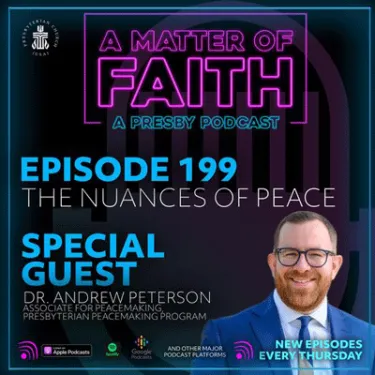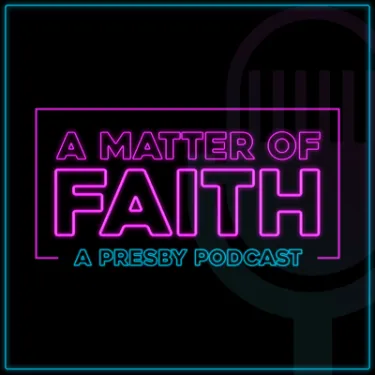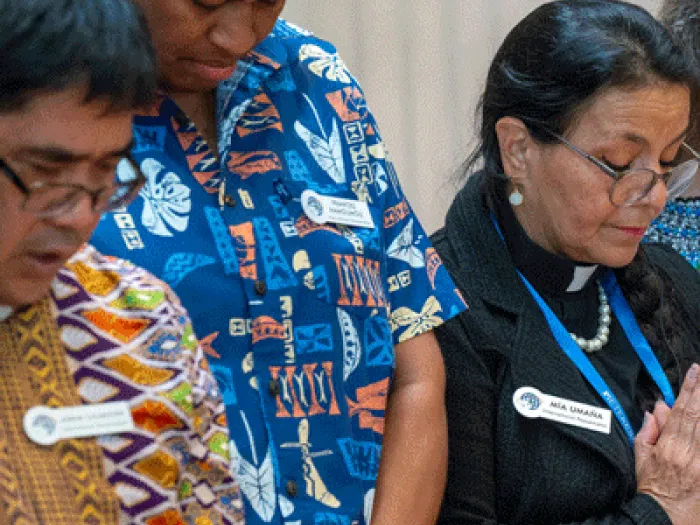Peacemaking work is both needed and nuanced

Dr. Andrew Peterson, Associate for Peacemaking in the Presbyterian Peacemaking Program, is the most recent guest on ‘A Matter of Faith: A Presby Podcast’

LOUISVILLE — Dr. Andrew Peterson, who came to his work with the Presbyterian Peacemaking Program after several years in the academy, now finds himself in rarified company: the guest on this week’s “A Matter of Faith: A Presby Podcast” will also rotate in from time to time to host the podcast alongside longtime hosts Simon Doong and the Rev. Lee Catoe.
Listen to their 47-minute conversation, called “The Nuances of Peace,” here. The hosts led by asking Peterson to discuss the terms “peacemaking,” “peacebuilding” and “peacekeeping.”
With peacemaking, our mind often turns to trying to secure an end to violent conflicts, Peterson said. “If you peel it back a half-layer from that, you can fold in related work that seeks to make peace imaginable or desirable,” he said. “You don’t get there in any conflict unless it’s possible for people engaged in the conflict to see a way forward and to want it and feel like it’s worth the sacrifices it will require.”
Peacebuilding is a part of the language used following a violent conflict. “Something needs to improve here, and there will be real work. Lots of institution building or rebuilding has to be done,” Peterson said. “You have a civic sphere that needs to be rebuilt as well.”
An example of peacebuilding is reparations. “Conflict has ended, but scars of wrong remain,” Peterson said. “We try to re-engage each other, but there’s a lot of injustice to work through.”
Peacekeeping includes “the things you are building toward. … The most important relationships in our life are oftentimes longstanding and require constant maintenance, and it’s the same for civic relations and international politics. The maintenance falls under the banner of peacekeeping.”
Defining peace requires language that describes “the highest ideals we have with relationships at every level,” Peterson said. The Rev. Dr. Martin Luther King Jr. taught that peace is not just the absence of conflict, but the presence of justice. For Peterson, a just society requires “real flourishing and civic love that neighbors share. They feel like they’re in a home they own together.”
The more expansively we define peace, “the more opportunities you’re going to have to employ these terms in contexts that don’t just have to do with violent conflict or international conflict between countries,” Peterson said. We use these terms today “to talk about what we want from our social and political movements. From there you can see how we can expand those terms to cover an incredibly diverse range of things as we pursue the kind of flourishing, peaceful, whole, fulfilling lives that we want to share with each other.”

In armed conflicts, observers see mainly aggressors and victims. “But to the parties — and this matters to the parties — both sides have some claim to feeling aggrieved. You trade back and forth further grievance, and it becomes cyclical and heaps up the feelings on both sides and deepens the divisions.” How long wounds have been added to and have been kept fresh has maintained the level of despondency in, for example, the Israel-Palestine conflict. “There’s a real value to breaking that cycle,” he said, “but it’s not going to be anything close to delivering a durable or sustainable peace.”
Embarking on peacemaking work close to home “is our best chance of doing this work really well,” Peterson said. He cited the PC(USA)’s Center for the Repair of Historic Harms as peacemaking that’s “owning up to our legacy, especially here in the U.S., the history that we know the best and should own explicitly and be clear about our long history of complicity and active participation in racial domination in America. We can do a lot to say what we got wrong there in a way I think will still help us today.”
“We in the United States,” he said, “are still in the early stages of having a just country.”
The question remains, Peterson said, whether peacemaking “is best done on the mission-trip model or by a more long-term, systemic approach where we equip folks who are on the ground who understand things and are engaged in a way that gives them representational authority to do the work in a durable and helpful kind of way.”
To cite an example, the work of preventing gun violence has shifted to be grant-based, Peterson said. “We want folks across the country to be empowered to do the kinds of gun prevention and surrender activities in their communities that make sense to them,” he said.
All of the foci of the Matthew 25 movement are intersectional, he noted. “It’s hard to think about dismantling structural racism without eradicating poverty,” Peterson said. “It’s hard to think about pursuing climate change in a just and equitable way without paying attention to the long history of racial domination and forced poverty in this country.”
“There are so many things to keep your eye on,” he said, “and the more you do, the more opportunities you have to get this right.”
New episodes of “A Matter of Faith: A Presby Podcast” drop every Thursday. Watch previous editions here.
You may freely reuse and distribute this article in its entirety for non-commercial purposes in any medium. Please include author attribution, photography credits, and a link to the original article. This work is licensed under a Creative Commons Attribution-NonCommercial-NoDeratives 4.0 International License.



